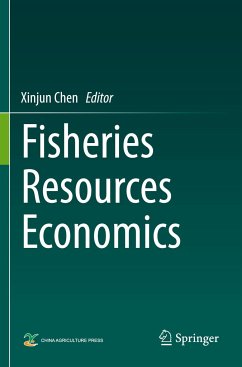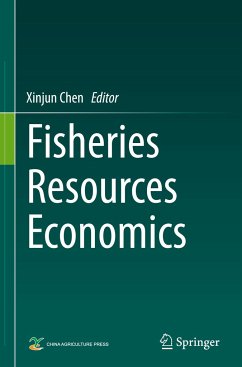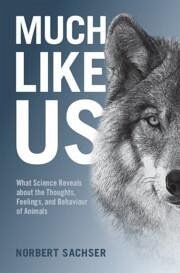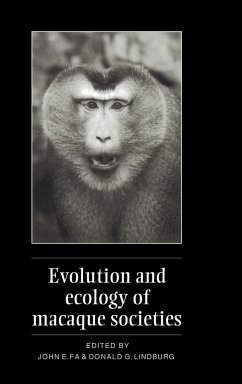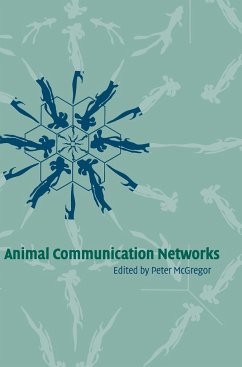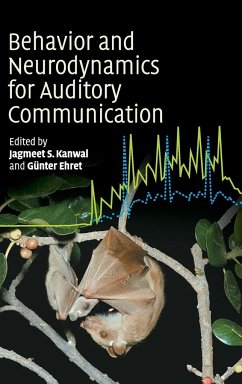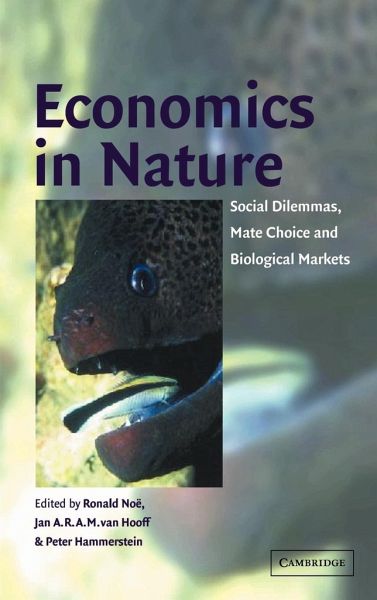
Economics in Nature
Social Dilemmas, Mate Choice and Biological Markets
Herausgeber: Noe, Ronald; Hammerstein, Peter; Hooff, J. A. R. A. M. van
Versandkostenfrei!
Versandfertig in 1-2 Wochen
121,99 €
inkl. MwSt.

PAYBACK Punkte
61 °P sammeln!
Since the development of game theory, the analysis of animal behaviour using the theories of economics has become a growing field of biological research in which models of games and markets play an important role. Studies of sexual selection, interspecific mutualism and intraspecific cooperation show that individuals exchange commodities to their mutual benefit; the exchange values of commodities are a source of conflict, and behavioural mechanisms such as partner choice and contest between competitors determines the composition of trading pairs or groups. These 'biological markets' can be exa...
Since the development of game theory, the analysis of animal behaviour using the theories of economics has become a growing field of biological research in which models of games and markets play an important role. Studies of sexual selection, interspecific mutualism and intraspecific cooperation show that individuals exchange commodities to their mutual benefit; the exchange values of commodities are a source of conflict, and behavioural mechanisms such as partner choice and contest between competitors determines the composition of trading pairs or groups. These 'biological markets' can be examined to gain a better understanding of the underlying principles of evolutionary ecology. In this volume scientists from different disciplines combine insights from economics, evolutionary biology and the social sciences to look at comparative aspects of economic behaviour in humans and other animals. Aimed primarily at evolutionary biologists and anthropologists, it will also appeal to psychologists and economists interested in an evolutionary approach.
Table of contents:
Preface; 1. Games and markets: economic behaviour in humans and other animals Peter Hammerstein; Part I. Economic Behavior in Social Networks: 2. Social dilemmas and human behaviour Elinor Ostrom; 3. Cooperation and collective action in animal behaviour Charles Nunn and Rebecca J. Lewis; 4. Conflict, reconciliation and negotiation in non-human primates: the value of long-term relationships Jan A. R. A. M Van Hooff; Part II. Biological Markets: 5. Biological markets: partner choice as the driving force behind the evolution of mutualisms Ronald Noë; 6. The utility of grooming in baboon troops Louise Barrett and Peter S. Henzi; 7. The cleaner fish market Redouan Bshary; 8. Modeling interspecific mutualisms as biological markets Jason D. Hoeksema and Mark W. Schwartz; Part III. Mating Markets: 9. Human mate choice strategies Boguslaw Pawlowski and Robin I. M. Dunbar; 10. How does mate choice contribute to exaggeration and diversity in sexual characters? Andrew Pomiankowski and Yoh Iwasa; 11. Information about sperm competition and the economics of sperm allocation Geoffrey A. Parker and Mike A. Ball; 12. The economics of male mating strategies Robin I. M. Dunbar.
Applying models of economic theory to evolutionary ecology has become a growing area of research in which games and markets play an important role. This volume takes a multi-disciplinary approach to compare economic behaviour in humans and other animals. It is aimed at evolutionary biologists, anthropologists, psychologists and economists.
Applies models of economic theory to behavioural and evolutionary ecology in humans and other animals.
Table of contents:
Preface; 1. Games and markets: economic behaviour in humans and other animals Peter Hammerstein; Part I. Economic Behavior in Social Networks: 2. Social dilemmas and human behaviour Elinor Ostrom; 3. Cooperation and collective action in animal behaviour Charles Nunn and Rebecca J. Lewis; 4. Conflict, reconciliation and negotiation in non-human primates: the value of long-term relationships Jan A. R. A. M Van Hooff; Part II. Biological Markets: 5. Biological markets: partner choice as the driving force behind the evolution of mutualisms Ronald Noë; 6. The utility of grooming in baboon troops Louise Barrett and Peter S. Henzi; 7. The cleaner fish market Redouan Bshary; 8. Modeling interspecific mutualisms as biological markets Jason D. Hoeksema and Mark W. Schwartz; Part III. Mating Markets: 9. Human mate choice strategies Boguslaw Pawlowski and Robin I. M. Dunbar; 10. How does mate choice contribute to exaggeration and diversity in sexual characters? Andrew Pomiankowski and Yoh Iwasa; 11. Information about sperm competition and the economics of sperm allocation Geoffrey A. Parker and Mike A. Ball; 12. The economics of male mating strategies Robin I. M. Dunbar.
Applying models of economic theory to evolutionary ecology has become a growing area of research in which games and markets play an important role. This volume takes a multi-disciplinary approach to compare economic behaviour in humans and other animals. It is aimed at evolutionary biologists, anthropologists, psychologists and economists.
Applies models of economic theory to behavioural and evolutionary ecology in humans and other animals.





